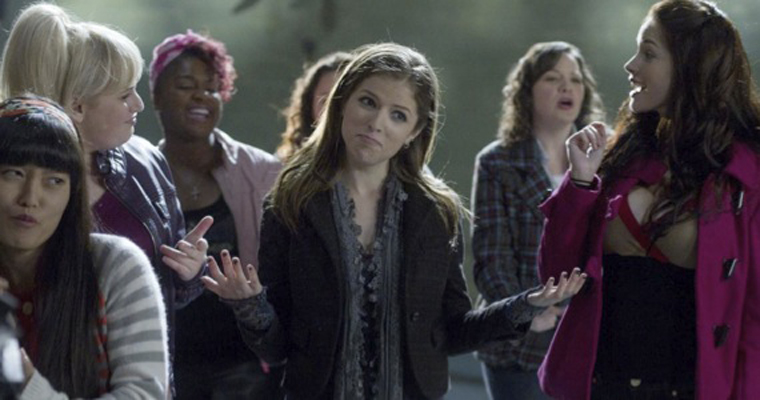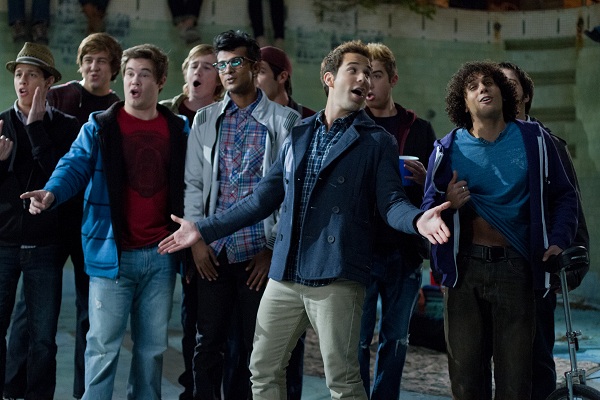
Courtesy of Universal Studios
By all accounts, Pitch Perfect has no right to succeed as well as it does: it’s a film about an a cappella singing competition starring an Oscar nominee (Anna Kendrick for Up In The Air) and features a recurring projectile vomiting gag. So why was the film so much d*mn fun?!
Let’s bitch it out…Pitch Perfect is one of the most pleasant surprises I’ve had at the theatre recently. The film could easily be a disaster, and yet it’s drumming up solid business in limited release and winning over critics (such as Entertainment Weekly) and consumers alike.
Let’s preface this review by stating a few obvious facts: this is not a film for everyone. If you’re not particularly fond of singing, it’s probably not going to be your cup of tea, no matter how hilarious you found Rebel Wilson in Bachelorette and/or Bridesmaids.
If, however, you enjoy the sub-genre of films which tackle competitive “insert unorthodox activity (drumline, cheerleading, breakdancing)” then this may just be the perfect film for you. The closest comparison that comes to mind is Bring It On, the surprise summer hit of 2000 that introduced “cheer-ocracy” and Big Red into the cultural lexicon. Side Note: If that means nothing to you, you’ve clearly never seen the Kristen Dunst vs Gabrielle Union race-relations cheer-off flick, and you may have just discovered the perfect double bill.
Much like its perky predecessors, Pitch Perfect tows the line between a stereotypical narrative featuring familiar stereotypes and a vibrant, off-beat, and – dare I say it? – sassy comedy. This is a film that’s not afraid to make crystal meth jokes, features an extended scene of two girls singing Gavid Guetta’s hit song ‘Titanium’ to each other naked in the shower and showcases executive producer Elizabeth Banks in a Best In Show role as one-half of an overly candid a capella commentator pair (the other half is filled to perfection by John Michael Higgins). It’s also filled with weirdly memorable lines of dialogue (you’ll catch yourself adding the prefix “aca” to everything in the same way Bring It On taught us to add “cheer” to everything: aca-awkward is the new cheer-ocracy).
Kendrick gets the spotlight as the top billed actor. Much like Bring It On, most of the conflict centers on her bristly resistance to another female in a similar position of power. In this case, that’s Anna Camp’s Aubrey, the leader of the all-female group The Bellas. Aubrey maintains that a static song-list and safe dance moves/costumes will earn the group of ragtag misfits a spot in the finals. Without a doubt the character most people will walk away discussing is Rebel Wilson’s Fat Amy. Wilson, who seems to be everywhere these days, is playing a tweaked version of her typical blunt, outspoken, confidently full-bodied woman, but even if you’re tired of the schtick or feels she’s overexposed, there’s no denying that Fat Amy gets all of Pitch Perfect‘s best jokes and physical comedy bits. Additional laughs come courtesy of Lilly (Hanna Mae Lee) who’s character barely speaks above a whisper, which helps to mask a number of surprising character reveals, as well as the Treblemakers – the Bellas all-male a cappella competitors – who delight in tormenting the girls.

Courtesy of Universal Studios
The film wouldn’t be proper female fodder without a healthy dose of romance. The relationship between Kendrick’s Beca and Skylar Astin’s Jesse is inevitable from the moment they first lock eyes, despite the fact that the connection feels more platonic than romantic. Admittedly I would have liked it if Beca’s dialogue about the predictability of the end of films applied to the movie she’s in, but the movie is more interested in reinforcing Jesse’s response (“That’s the best part!”) that contradicting it. And while the narrative between them plays out predictably, ultimately you go along with it because they’re cute together.
There are a few elements that don’t quite work, including the other girls in the Bellas. Many of them are disappointingly one dimensional characters that fail to transcend broad labels, including one Jezebel describes simply as “the black lesbian” (I would add Lee’s “quiet Asian” and Alexis Knapp’s “dumb slut”). There is the suggestion that the film recognizes these girls aren’t well-developed (one of them jokes that Aubrey hasn’t noticed they’ve been there all year), but this doesn’t excuse the fact that we don’t even know many of these girls’ names.
I also wasn’t overly fond of a subplot about Becca’s parents divorce. Not only do all of the scenes with her father come off as Psychology 101 for her refusal to emotionally connect with others, they fail to contribute to the character in any meaningful way. Every time her father appears, it feels like someone’s letting the air out of the room when all you want to do is get back to the singing.
Aside from a few relatively minor complaints, however, Pitch Perfect is a huge surprise. The ads make it look light and frivolous, and although it is, this doesn’t have to be a negative disparaging categorization (not every film is gunning for an Oscar; many simply seek to entertain). What distinguishes Pitch Perfect from other mainstream fare is that it is a very self-assured comedy that delivers on its promise. If you can overcome the stigma and see past the Glee-like aesthetics (which is also gently ribbed), the film will lure you in with its infectious mix of match-ups, catchy lingo and enjoyable characters. It’s a worthy successor to modern day classic teen/college films and guarantees a fun night out at the theatre.
Pitch Perfect is currently playing in limited release. It expands nationwide Friday, Oct 5
It was a fun movie, and the “colour commentating” of the competitions were HILARIOUS. While I was expecting a good time, I laughed harder and longer than I ever expected!!